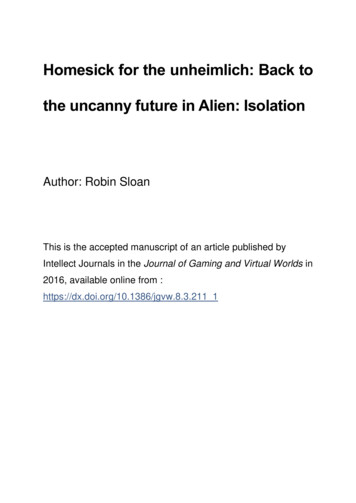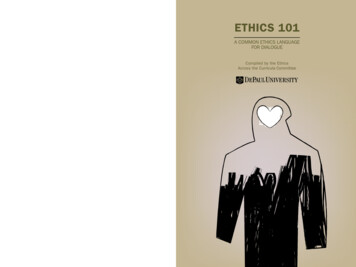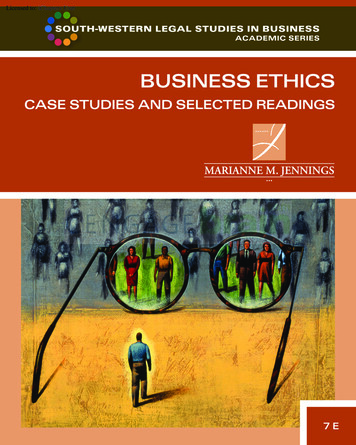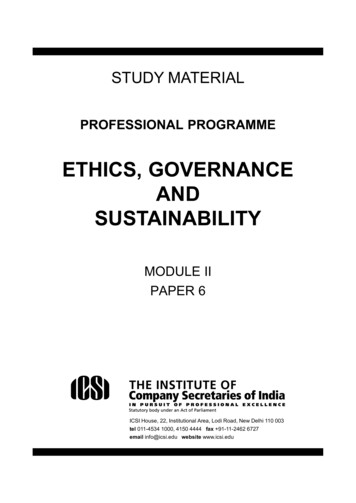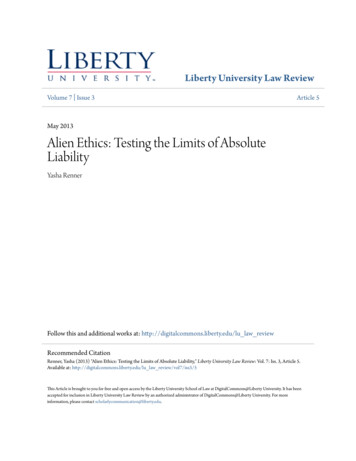
Transcription
Liberty University Law ReviewVolume 7 Issue 3Article 5May 2013Alien Ethics: Testing the Limits of AbsoluteLiabilityYasha RennerFollow this and additional works at: http://digitalcommons.liberty.edu/lu law reviewRecommended CitationRenner, Yasha (2013) "Alien Ethics: Testing the Limits of Absolute Liability," Liberty University Law Review: Vol. 7: Iss. 3, Article 5.Available at: http://digitalcommons.liberty.edu/lu law review/vol7/iss3/5This Article is brought to you for free and open access by the Liberty University School of Law at DigitalCommons@Liberty University. It has beenaccepted for inclusion in Liberty University Law Review by an authorized administrator of DigitalCommons@Liberty University. For moreinformation, please contact scholarlycommunication@liberty.edu.
COMMENTALIEN ETHICS:TESTING THE LIMITS OF ABSOLUTE LIABILITYYasha RennertI. INTRODUCTIONThe student of history knows that our Western civilization is the story ofChristendom and its great work in Europe.' Imperial Rome is thought tohave suffered a violent death at the hands of foreign invaders, yet by allcredible accounts it was transformed from within. Indeed, the decay of theRoman Empire became the fertile soil from which the European nationsemerged;2 and by the Middle Ages, there had been a continuity of Europeancivilization, under the discipline and moral authority of the CatholicChurch, for over a thousand years.' It was during this period that powerfulminds would affirm that final end of man, which is (and shall ever be)happiness.' That freedom should be exercised in the pursuit of happiness isa familiar concept in the Land of the Free.' But the medieval man wastaught a truer doctrine than we, for he was, in a sense, the firstborn of faithand reason, and therefore heir to the greatest flowering of philosophy thet Submissions Editor, LIBERTY UNIVERSITY LAW REVIEW, Volume 7. J.D. Candidate,Liberty University School of Law (2013); B.S., Portland State University (2006). This paper isdedicated to my wife, Denise, and our Lydie Bug.1. See John 14:12 (English Standard Version) ("[G]reater works than these will hedo. ."). Subsequent citations to Holy Scripture are to the ESV unless otherwise indicated.2. There is a short-lived exception in the case of the Roman province of Britain, whosesilence between the middle of the fifth century until the landing of St. Augustine and hismissionary priests in A.D. 597 has become the source of many unhistorical speculationsgenerally described as the "Anglo-Saxon conquest." For an account of that period of Britain'shistory, and of the history of Europe generally, see HILAIRE BELLOC, EUROPE AND THE FAITH70-101 (Dodo Press 2007) (1920).3. Id. at 108-09. Indeed, it was the Catholic Church, and not the popular and falseexplanation of barbarian invasion, which transformed the old Roman order, thoroughlyPagan, into a unified Christian civilization. Id. at 51.4. See, e.g., 2 ST. THOMAS AQUINAS, SUMMA THEOLOGICA bk. I. pt. II. Q.1, art. 7, sedcontra (Fathers of the English Dominican Province trans., Christian Classics 1981) (c. 1265).5. THE DECLARATION OF INDEPENDENCE para. 2 (U.S. 1776) ("We hold these truths to beself-evident, that all men are created equal, that they are endowed by their Creator withcertain unalienable Rights, that among these are Life, Liberty and the pursuit ofHappiness.").
398LIBERTY UNIVERSITY LAW REVIEW[Vol. 7:397world has ever known. It was not to last, however, and by the eighteenthcentury, the children of an older Europe, now fathers of a nation, came toinherit the tired remains of a supernatural ethic, which these men raised asthe banner of their newly minted government. That flag still flies today,though its colors have since faded."Happiness" is a universal calling, as varied as life itself. But humanityerrs if it concludes that "happiness" is simply subjective, merely relative, orwithout transcendent meaning. Even happiness has its limits, whichcommon sense since birth has taught us. The truth is we ought not indulgeour heart's every urge, as the prophets of old had warned.6 Happiness, welearn, is not the same as pleasure;7 one is spiritual, the other sensual. Thus,the mystery of freedom is counted among those paradoxes for which theChristian faith is known, often attacked, and has made its business todefend against the errors of every age. As one esteemed writer has recentlyreminded us, "Liberty is a power perfecting man, and hence should havetruth and goodness for its object."' The paradox, then, is simply this: thatman is most free when he knows his limits-and walks -within them.Therefore, if authentic liberty be our guide, the way is narrow indeed, but itis the only way which secures our happiness.'This principle is fundamental, but especially so to the criminal law,which is chiefly concerned with judging human actions that have strayedfrom the straight and narrow. Consequently, the law's machinery isgenerally tooled to operate along the cliffs of human nature; that is, wherethe use of freedom is safely viewed by all as immoral. In all cases, however,freedom is the key to culpability. Thus, it is said that coercion will in somecases excuse an unlawful act,'o since coercion is contrary to freedom," theexercise of which is an essential catalyst of crime and therefore punishment.6. Jeremiah 17:9-10.7. Many ethical writers have confused the two. The errors of utilitarianism, aphilosophy of ethics in opposition to the classical notion of virtue, is one such example. See,e.g., JEREMY BENTHAM, THE PRINCIPLES OF MORALS AND LEGISLATION 1-24 (PrometheusBooks 1988) (1789).8. LEO XIII, IMMORTALE DEI para. 32 (Nov. 1, 1885), reprinted in THE licals/documents/hfI-xiiienc 01111885immortale-dei en.html.9. See Matthew 7:14.10. JEROME HALL, GENERAL PRINCIPLES OF CRIMINAL LAW 438-39 (photo. reprint 2005)(2d ed. 1960).
2013]ALIEN ETHICS399But not all coercion does violence to freedom, otherwise law itself wouldbe a nullity. In the American tradition, as with the Western legal traditionin general, the goal of government is the "public good."I2 To this end lawsare promulgated, their power coercive." In the United States, however,government finds its source in the people." Thus, under the American formof government, freedom is, in theory," bound by majority rule," save thosesubjects which the people have expressly withdrawn from government'scompetence.But even without the legislator and the coercive power of human law,there is another lawgiver and another law-a higher law-that tugs on ourconscience. If human nature was in perfect accord with God's higher law,then a sort of supernatural justice would be the hallmark of the living: love11. "Actus me invitofactus non est meus actus, an act done by me against my will is notmy act . " JOEL PRENTISS BISHOP, 1 COMMENTARIES ON THE CRIMINAL LAW § 288 (7th ed.1882) (internal quotation marks omitted).12. THE DECLARATION OF INDEPENDENCE para. 3; see also 2 AQUINAS, supra note 4, bk. I.pt. II. Q.90, art. 2.13. Frederic Bastiat defined law as force in defense of the collective right to life, liberty,and property. See FREDERIC BASTIAT, THE LAW 6, 24, 28 (Dean Russell trans., The Found. forEcon. Educ., Inc. 1950) (1850).14. See THE DECLARATION OF INDEPENDENCE para. 2 ("Governments are institutedamong Men, deriving their just powers from the consent of the governed.").15. The political theory of social contract is contrary to St. Paul's doctrine. See Romans13:1-2 (teaching that the power of ruling comes from God); see also LEO XIII, supra note 8,paras. 24-26 (criticizing the social contract theory of government). "[Tihe pact which theyallege is openly a falsehood and a fiction," says Pope Leo XIII, "and that it has no authority toconfer on political power such great force, dignity, and firmness as the safety of the State andthe common good of the citizens require." LEO XIII, DIUTuRNuM para. 12 (June 29, 1881),reprinted in THE PAPAL ENCYCLICALS, supra note 8, at 53, available licals/documents/hfIxiiienc 29061881 diuturnumen.html.16. But see HILAIRE BELLOC, AN ESSAY ON THE RESTORATION OF PROPERTY 31 (2002)("Parliaments have everywhere proved irreconcilable with democracy. They are not thepeople. They are oligarchies, and those oligarchies are corrupt because they pretend to a falsecharacter and to be, or to mirror, the nation."). Hilaire Belloc is a notable historian andardent defender of private property and true economic freedom, as opposed to industrialcapitalism, which has plunged both England and the United States back into the ancientinstitution of slavery. See also G. K. CHESTERTON, THE OUTLINE OF SANITY 7 (1927) ("Thetruth is that what we call Capitalism ought to be called Proletarianism. The point of it is notthat some people have capital, but that most people only have wages because they do nothave capital.").
400LIBERTY UNIVERSITY LAW REVIEW[Vol. 7:397would be the rule, and all would freely abide by it. Of course, it is not thatsimple. Freedom has been polluted and man's will weakened. "[W]hen Iwant to do right," the Apostle complains, "evil lies close at hand. For Idelight in the law of God, in my inner being, but I see in my membersanother law waging war against the law of my mind . . "" That "other" lawis a natural craving for pleasure, a kind of coercion from within, whichoften comes into conflict with our spiritual good." When that happens astruggle ensues; to yield is to sin. It is a life-long struggle that engages us.The taming of that wild and freedom-filled creature called Man is onereason for the law of crimes. Admittedly, the law is powerless to absolve usof our sins. Yet, for some, its avenues point the way back to basic freedomsand, hopefully, the road to forgiveness. For the vast majority, however, thelaw stands as a living sentinel, the immortal guardian of civilization, whosepromise of public vengeance, fueled by the memory of a moral traditioncenturies in the making, preserves every generation in relative safety andhappiness.Nevertheless, the modern world has changed dramatically in the last twohundred years, and it continues to do so at a frantic pace. The memory ofolder things, better things, has faded in so much novelty and blind progress,or has dissolved in the emptiness of skepticism. As societies becomeincreasingly complex so do their laws, and the strain on legal systems toprovide for the common good are pressed to their natural limits. Ironically,however, the growing number of laws invoking the primitive doctrine ofabsolute liability are both sign and symptom of our civilization's drift backto barbarism. These so-called "public welfare offenses" represent adangerous departure from established principles of crime and punishment,settled throughout all Europe by the High Middle Ages.This Comment examines the constitutional limits of the public-welfareoffense doctrine, which, since its formal recognition in the mid-nineteenthcentury, has snowballed into a very real menace. It is difficult to imagineany conduct that cannot be proscribed and therefore punished by the policepower; and the only effective limits thus far seem to be the ancientrequirements of legality and proportionality. But the latter is on shaky17. John 13:34 ("A new commandment I give to you, that you love one another: just as Ihave loved you, you also are to love one another.").18. Romans 7:21-23.19. Galatians 5:17 ("For the desires of the flesh are against the Spirit, and the desires ofthe Spirit are against the flesh, for these are opposed to each other, to keep you from doingthe things you want to do.").
2013]ALIEN ETHICS401ground and would benefit from entrenchment. The rule of constructionrecognized in Morissette v. United States20 has been helpful when a statute issilent as to mental elements; and Lambert v. California2 1 has certainlyslowed the doctrine's progress for crimes of omission. But these two modestroadblocks cannot defend against the urgent pace and direction the UnitedStates is headed.This Comment suggests, first, that the doctrine of mens rea with respectto traditional crime should be protected by the Due Process Clause of theFourteenth Amendment-the state cannot alter the fundamental nature ofcrime. Second, public welfare offenses that are sufficiently grave violate theFirst Amendment to the United States Constitution, unless the state proves,under the test proposed in this Comment, that such laws are legitimateexercises of the police power. Third, the willful offender's actual knowledgeof a public welfare offense is always sufficient for conviction, and thereforeconstitutional in all circumstances, so long as other constitutionalrequirements are satisfied. We turn now to the concept of crime.II. BACKGROUNDUntil relatively recent times, the criminal law in England and the UnitedStates was primarily concerned with establishing the moral guilt orinnocence of the accused. Punishment in the early cases was severe andoften deadly; thus, the law grew sensitive to the rights of the accused. Thatsensitivity fueled its central inquiry: mens rea.22 Like a magician, the law'smain act was a revelation, the very faculty of freedom in a flash of light andpuff of smoke. (The fact of its existence was itself a revelation long ago.) Buttoday's criminal law is quickly losing interest in the show; it is growing up,or so it thinks. Magic is an amusement fit for children but not the modernrascal, infinitely skeptical of all things supernatural. In time, such doubtingis certain to penetrate even the natural order. Thus, the mature skeptic whofirst declared that all magic is superstition now campaigns for the abolitionof all magicians. Meanwhile, the magician patiently waits for the believer,practicing his art with the knowledge that law is not invention; law is magic.Sir William Blackstone believed in magic. "[T]o constitute a crime againsthuman laws," he writes, "there must be, first, a vicious will; and, secondly,20. Morissette v. United States, 342 U.S. 246 (1952).21. Lambert v. California, 355 U.S. 225 (1957).22. Mens rea is a Latin phrase that means "guilty mind." In the context of criminal law,it generally signifies the mental element necessary to convict for any crime.
402LIBERTY UNIVERSITY LAW REVIEW[Vol. 7:397an unlawful act consequent upon such vicious will." 23 The visible andinvisible coalesce in Blackstone's doctrine. To understand it, we turn oncemore to the medieval man, whose metaphysics would become thefoundation for the common law of crimes.A. A Tradition Rooted in AntiquityWe begin our story a mere century after the onset of the Middle Agesand with the Leges Henrici Primi,24 compiled about the year 1118. The Legeshas been described as one of the earliest compilations of "true English lawthat was neither Roman nor canon law."25 Despite this potentiallymisleading description,2 6 the Leges is purportedly an effort to translate intoLatin the legal codes of the Anglo-Saxon kings, whose settlements alongBritain's eastern shore severed the Roman province from continental23. 4 WILLIAM BLACKSTONE, COMMENTARIES *21.24. LEGES HENRICI PRIMI (L. J. Downer ed. & trans., Oxford Univ. Press 1972) (c. 1118).25. Francis Bowes Sayre, Mens Rea, 45 HARV. L. REV. 974, 978 (1932).26. The statement suffers from a modern notion of nationalism. In the twelfth century,however, no such feeling existed among the peoples of Western Europe. Moreover, ProfessorSayre's description of the Leges echoes the unhistorical thesis that Britain, and thereforeEnglish civilization, became a barbaric and German thing, and this since the middle of thefifth century. See supra note 2. It is professed by the following distortions of history that theinstitutions common to all Europe during the decline of Roman civilization were, in Britain,the product of a wholly new order, German in origin, which conquered the Roman provinceby the combined violence of its Pagan neighbors to the north and bands of local pirates longremembered by the name of "Saxon." BELLOC, supra note 2, at 80-81, 100. In his lectures onthe common law, Pollock likewise speaks of the virtues of his "heathen ancestors" and theirlasting influence on the isle. SIR FREDERICK POLLOCK, THE GENIUS OF THE COMMON LAW 8-11(photo. reprint 2003) (1912). But as truth would have it, Britain survived that period ofrandom warfare and institutional decline, 150 years in all, with but few novelties added,namely, the admixture of German with Latin dialects, or what is called "Teutonic." BELLOC,supra note 2, at 86, 94-95. "By the time that this old Roman province of Britain re-arises asan ordered Christian land in the eighth century," writes Belloc, "its records are kept not onlyin Latin but in the Court 'Anglo-Saxon' dialects . . " Id. at 101. But no permanent break inthe continuity of European civilization was thereby effected. Professor Berman alsoperpetuates this false thesis throughout his book Law and Revolution, which is especiallyevident in his discussion of the history of London. HAROLD J. BERMAN, LAW AND REVOLUTION381 (1983) ("Although Roman legions had occupied the town from the first to the fifthcenturies A.D., little that was Roman survived the Anglo-Saxon invasions except for theremains of roads and buildings and the great stone wall."). On the contrary, Belloc explains,"One thing did not disappear, and that was the life of the towns." BELLOC, supra note 2, at 91."The supposition that the Roman towns disappeared is no longer tenable," he continues,"and the wonder is how so astonishing an assertion should have lived even for a generation."Id. at 94.
2013]ALIEN ETHICS403Europe for 150 years, from the middle of the fifth century until the landingof St. Augustine and his missionaries in the year 597.27The Leges contains an assortment of laws, ecclesiastical and secular, andmaxims. Its significance in the study of criminal law stems from its sanctionof absolute liability for a great number of offenses. As Professor Sayreobserves, the Leges contains much law that "smacks strongly of liabilitywithout fault and certainly without criminal intent."2 8 For example, "[i]fsome one in the sport of archery or other form of exercise kill another witha missile or by some such accident, let him repay; for the law is that he whocommits evil unknowingly must pay for it knowingly."29 Such is thesupposed novelty of the Germanic tribes. But the historian Mr. HilaireBelloc teaches otherwise. Money damages for injuries were among the"institutions . . common to all Europe. Nothing but ignorance," he says,"can regard them as imported into Britain . by the Pirates of the NorthSea.""Whatever its source, it is a tradition in tension with another, for the Legesalso illustrates the beginning of an ever-growing concern with moral guilt asa requisite to punishment. Among the many "passages stronglyimpregnated with the surviving notion of absolute liability irrespective ofguilty intent," Professor Sayre points out an exception-a "scrap copied infrom the teachings of the church" 3 1-and the object of our inquiry. In asection discussing perjury, it is said that a person is not guilty unless hisintention is guilty: "Reum non facit nisi mens rea."32 The Latin proverb27. See supra note 2 and accompanying text.28. Sayre, supra note 25, at 979. But see Percy H. Winfield, The Myth of AbsoluteLiability, 42 L. Q. REv. 37, 50 (1926) (stating that absolute liability in medieval law is a"rather inaccurate generalization").29. Sayre, supra note 25, at 978 (quoting LEGEs HENRICI PRIMI c. 88, 6).30. BELLOC, supra note 2, at 95.31. Sayre, supra note 25, at 983. In fact the Leges is littered with such scraps: "No oneshall give the sacrament to a person who delays submitting to the judges he has chosen, untilhe obeys." LEGES HENRICI PRIMI, supra note 24, c. 5, 5b. "The apostle says that an accusationagainst a priest is not to be entertained without two or three proper witnesses; how manymore then should there be in the case of bishops . ?"Id. c. 5, 15. "The sins of others shall inno way be prejudicial to anyone who has led a good life in the church." Id. c. 5, 18d. "Thereshall be dealt with first the due rights of the Christian faith; secondly pleas of the crown, andfinally the causes of individuals shall be settled with proper amends." Id. c. 7, 3. "A womanshall do penance for three years if she intentionally brings about the loss of her embryobefore forty days; if she does this after it is quick, she shall do penance for seven years as ifshe were a murderess." Id. c. 70, 16b.32. Id. c. 5, 28b.
404LIBERTY UNIVERSITY LAW REVIEW[Vol. 7:397comes from St. Augustine of Hippo. In a sermon on James 5:12,33 theCatholic bishop stated to the effect that "if a man believing that no rain fellin a certain spot, nevertheless for self-interest testifies that it did rain there,even though in fact it did rain he is a perjurer in the eyes of God.""Because of the maxim's odd placement in the Leges, however, and due tothe overall disunity of the work, it is thought by some to supply acontextual, rather than general, rule of liability. 5 Even assuming this is thecase, and as Professor Lvitt concludes, the author of the Leges-himself acleric-would have been familiar with "the principle of mens rea as anecessary ingredient of sin"" through the influence of the penitentialbooks, 37 particularly those of St. Finnian of Clonard, of the Irish church,and St. Theodore of Tarsus, the seventh Archbishop of Canterbury."Indeed, the entire volume is saturated with the truth of Lvitt's thesis.Appearing under the heading of homicide, for example, one finds thathomicide "is also committed in self-defense or in a just cause,"" followed bythe words of St. Augustine:If homicide is killing a man, it can sometimes happen withoutcommitting sin; for a soldier who kills his enemy, and a judge acriminal, and a person from whose hand a spear flies perhaps33. "But above all, my brothers, do not swear, either by heaven or by earth or by anyother oath, but let your 'yes' be yes and your 'no' be no, so that you may not fall undercondemnation." James 5:12.34. Sayre, supra note 25, at 983 n.30; accord HALL, supra note 10, at 80 (suggesting thatSt. Augustine was the "likely point of dissemination among medieval legal scholars");Winfield, supra note 28, at 41. And St. Thomas, in his Summa, quotes the Catholic bishop ashaving said that "it is by the will that we sin, and we behave aright." 2 AQUINAS, supra note 4,bk. I. pt. II. Q.20, art. 1, sed contra. St. Thomas thus concludes that "moral good and evil arefirst in the will." Id. However, some scholars trace the doctrine, or at least its wider legalacceptation, to later developments. See, e.g., Albert Ievitt, Extent and Function of theDoctrine of Mens Rea, 17 ILL. L. REv. 578, 588-89 (1923) (stating that "the doctrine of mensrea came into the common law through the penitential books of the Catholic church inEngland in the ninth century"); BERMAN, supra note 26, at 181-82.35. See Winfield, supra note 28, at 40-41; Bernard Brown, The Emergence of thePsychicalTest of Guilt in Homicide 1200-1550, 1 TAS. U. L.REv. 231, 232 (1959).36. Albert Ievitt, The Origin of the DoctrineofMens Rea, 17 ILL. L. R. 117, 135 (1923).37. "The basis of these books are the patristic writings," says Lvitt, and various churchcouncils. Id. at 132.38. Id. at 132, 135.39. LEGEs HENRICI PRIMI, supra note 24, c. 72, lb.
2013]ALIEN ETHICS405involuntarily or accidentally, do not seem to me to commit a sinwhen they kill a man.oTherefore, in the context of sin and the ecclesiastical law, the principle ofmens rea seems evident, even advanced. A similar sentiment, equallyantique yet legally sophisticated, is found in a quote from St. Jerome in thevery next sentence: "Punishing murderers and those who commit sacrilegeis not a shedding of blood, but the due application of the laws."4 'By the late twelfth century, however, men would still resort to theordeal42 to adjudge culpability, "as trial by jury or by the oaths of witnesseswas not yet an accredited method of procedure."4 Perjury wascommonplace, as it is arguably even today, and compurgation by oaththerefore invoked the distrust of men accused of capital offenses. The Legesprovided that "[n]o one shall be convicted of the more serious charges onevidence alone."" "[T]he judicium Dei," says Mr. Edward J. White, "wassupposed to take the place of the false standards, too often erected byordinary mortals."4 ' Thus, it would seem that a belief in a guilty mind, andits theological underpinnings, which had taken firm root by the earlytwelfth century, was not yet in harmony with everyday legal procedure."The doctrine would be merely floating and without foundation in secularlaw until the reign of Henry III, who abolished the ordeal throughoutEngland in response to the decrees of the Fourth Lateran Council, whichforbade "the clergy to take part in the ceremony of the ordeal."4 1The onset of the Middle Ages is marked by its emergence from darkertimes, in which the old pagan order was slowly purged from Europe by the40. Id. c. 72, 1c. Professor Sayre seems to be in agreement: "Although the man whounwittingly caused another's death through pure misadventure may have been criminallyliable under the early Anglo-Saxon law, to punish him with death violated the ideas of moralguilt derived from the canonists." Sayre, supra note 25, at 980.41. LEGES HENRICIPRIMI,supra note 24, c. 72, 1d (internal quotation marks omitted).42. See id. c. 18, 1; c. 65, 3, 3a, 3b, 3c, 5; cf Numbers 5:11-31 (the Mosaic law ofjealousies).43. EDw. J. WHITE, Trial by Ordeal, in LEGAL ANTIQUITIES: A COLLECTION OF ESSAYSUPON ANCIENT LAWS AND CUSTOMS 155 (1913).44. LEGES HENRICIPRIMI,supra note 24, c. 31, 5.45. WHITE, supra note 43, at 154.46. Professor Sayre notes that the "growing power of the king" to pardon a convictedfelon was among the first procedural devices with which a felon could escape the deathpenalty. Sayre, supra note 25, at 980-8 1.47. WHITE, supra note 43, at 158 n.57. The ordeal was briefly revived in the reign ofJames I. in cases of witchcraft and sorcery. Id.
406LIBERTY UNIVERSITY LAW REVIEW[Vol. 7:397Catholic Church. And in the flowering of that high civilization, in whichEurope is said to have awoke, legal institutions were likewise clothed ingreater sophistication. Criminal law, at last, emerged from its pagan shell;and the learned authors all agree the Church played an important, if not theleading, role in the development of criminal law."8 The very language of thelaw, and the punishments 9 it imposed, invoked the sacramental system.soFor at least eight centuries, however, the Church had provided sinners andcriminals alike with a means of reconciliation with the faithful. The idea was48. See, e.g., Winfield, supra note 28, at 42 (stating that "the Church's influence [was] atwork"); see also Sayre, supra note 25, at 980 ("The canonists had long insisted that the mentalelement was the real criterion of guilt and under their influence the conception of subjectiveblameworthiness as the foundation of legal guilt was making itself strongly felt."); BERMAN,supra note 26, at 188 (discussing categories of intent developed by the canonists).49. "Anyone who kills a monk or cleric shall give up his arms and enter the service ofGod; and if he has done this accidentally and unintentionally, he shall do penance for sevenyears; if he did it intentionally he shall do penance until his life's end." LEGEs HENRICI PRIMI,supra note 24, c. 68, 7. "Anyone who is a party to homicide shall do penance for seven years,being for one year confined to bread and water." Id. c. 68, 10. "A person who kills anyrelative of his shall make amends by the fruits of penitence worthy in the sight of God, andthe measure of penance to be performed shall depend on whether his action was intentionalor unintentional." Id. c. 75, 5.50. One easily forgets how great were the developments in Christian doctrine arisingout of the Novatian schism. Novatian, a Roman priest, asserted the Church had not themeans to pardon the fallen, who, because of sins committed after baptism, were excludedfrom its communion. See JOHN HENRY CARDINAL NEWMAN, AN ESSAY ON THE DEVELOPMENTOF CHRISTIAN DOCTRINE 384-85 (Univ. of Notre Dame Press 6th ed. 2005) (1878). "Theremust be some provision in the revealed system for so obvious a need," writes Newman, sincethe Sacrament of Baptism could not be repeated. Id. at 384. The controversy was settled bythe end of the third century, at which time "as many as four degrees of penance wereappointed, through which offenders had to pass in order to a reconciliation." Id. at 385. Inmodern times, the power to pardon, from which we learn the Latin indulgentia orindulgence and the grossly misunderstood doctrine going by the same name, is taken forgranted by all democratic nations. See, e.g., U.S. CONST. art. 2, § 2 ("The President. shallhave Power to grant . Pardons for Offenses against the United States . ). Though not acommon practice of the infant Church, see NEWMAN, supra,at 385, 395, Scripture records St.Paul granting an indulgence to a man guilty of incest. 2 Corinthians2:10 ("For, what I havepardoned, if I have pardoned any thing, for your sakes have I done it in the person ofChrist.") (Douay-Rheims Version); see also 5 AQUINAS, supra note 4, supp. Q.25, art. 1, sedcontra (concluding that St. Paul could indeed "remit the punishment of a sin without anysatisfaction"; that is, without need of the Sacrament of Penance). Therefore, "whateverremission is granted in the court of the Church holds good in the court of God." Id. Q.25,art. 1, respondeo. Ironically, indulgences are today even more prevalent than in the MiddleAges, for the modern American criminal is often the beneficiary of a relaxed sentence by wayof plea bargaining with the
Frederic Bastiat defined law as force in defense of the collective right to life, liberty, and property. See FREDERIC BASTIAT, THE LAW 6, 24, 28 (Dean Russell trans., The Found. for Econ. Educ., Inc. 1950) (1850). 14. See THE DECLARATION OF INDEPENDENCE para. 2 ("Governments are instituted

